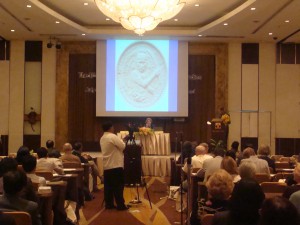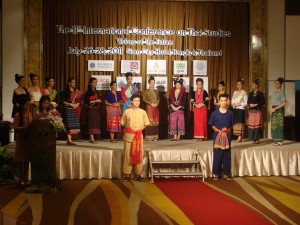The 11th International Conference on Thai Studies was held from 26th to 28th July 2011 at Siam City Hotel, Bangkok. This conference, held every 2 years, attracted more than 200 presenters and participants. With over 80 panels ranging from linguistics, culture, ethnicity, religion, politics, gender and even the “K-wave” that has hit Thailand recently, the conference was concerned with almost every issue pertaining to Thai society, and from an interdisciplinary perspective too. In short, the conference provided a meaningful and engaging platform for interdisciplinary dialogue on major developments in Thai society, or aspects relating to Thailand.
The central theme for the conference this year was “Visions of the Future” and it was around this theme that the invited speakers shared their thoughts on issues such as “The Challenges of Doing an Interdisciplinary Comprehensive Reference Book on Thailand” (by Prof. Dr. Gerald W. Fry) and “The Disappearing Past: Hidden Histories and Vanishing Envrionment” (by Prof. Dr. John Hartmann and Assoc. Prof. Dr. Ratanaporn Sethakul). This specific focus prompted and guided the panels as well, with most of the panels attempting to look towards the future of Thai society.
Indeed, it was an enriching experience to be able to present my work in front of internationally established academics and to exchange contacts with several of them. This was made possible with the generous funding from the faculty, as well as the support my supervisor and colleagues have given me. This, to me, is testament to the kind of environment FASS aims to provide its graduate students with – opportunities to develop intellectually, and on a regional, and global, level.
Overall, graduate study at FASS has allowed me to interact with fellow graduate students, both local and international, exposing me to a wider spectrum of perspectives. Enrolling in classes outside of my department, as well as having the privilege to attend various seminars and workshops, has vastly increased the amount of interactions with faculty and graduate students from diverse backgrounds and disciplines. This has had a huge impact on my scholarly development. Through debate, discussion and exchange of ideas with professors and peers, I learnt the value of collaborative endeavors (and how little I actually knew!). I believe this is what sets FASS, and its students, apart: the interaction with fellow like-minded individuals and more importantly, FASS’ focus on asking rigorous questions, interrogating issues and imagining possibilities.
By:
Allan Lee, MA Candidate
Teaching Assistant
Department of Sociology


